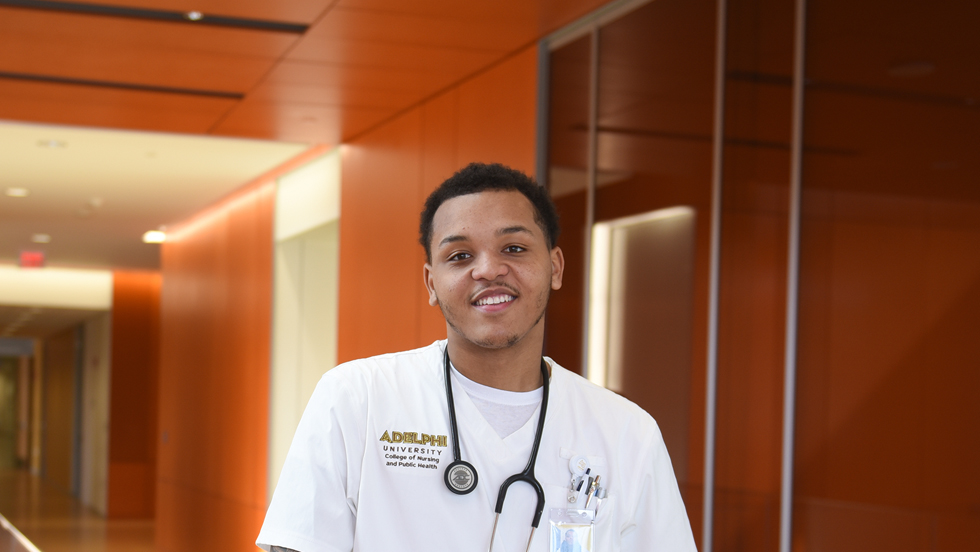
The United States is facing a nursing crisis.
The number of registered nurses is projected to decline by 1.5 million by 2030, due to factors such as retirement, burnout and a lack of new nurses entering the profession.
Can this crisis be averted by attracting more men to the profession?
Anthony Egan, director of the College of Nursing and Public Health’s Clinical Education and Simulation Lab (CESiL), thinks so—and he’s actively working to bring more men into the field and provide greater support for the men who make up about 13 percent of Adelphi’s nursing students.
Nationally, about 12 percent of registered nurses were men in 2022, an increase of nearly 400 percent from just 2.7 percent in the 1970s.
In Spring 2023, he established a chapter of the American Association for Men in Nursing (AAMN) at the College. The chapter—which met first in December 2022 and three times in the spring semester—now has 25 members, up from “about 15 or 20 people at the [October 2023] meeting,” according to Egan.
Recruiting men to the profession is a great way to address the present nursing shortage, Egan said. “We need to expand where we’re looking for nurses,” he explained. “Attracting men to nursing is one way to fill the staff shortages, but we also need to recruit people of different ethnic backgrounds so we can better serve patients.”
After its April 24 Open House and a successful May 2023 cornhole tournament fundraiser, he said, “Some faculty and alumni have said they will help fund it. We’re also looking for other avenues to permanent funding.”
Egan sees future meetings as “a place where men can discuss their thoughts and feel free to voice their concerns about nursing.” This fall, he added, “We are lining up guest speakers, such as a Navy nurse and a flight nurse from Northwell Health’s SkyHealth [as role models]. We’re also looking at having [TikTok comedian] Nurse Blake come to campus for a show in the PAC [Performing Arts Center]. But, like all things, [first] we need more involvement.”
The chapter had planned to hold officer elections in Fall 2024, but is now delaying that until membership grows further, Egan said. Joshua Roca ’23 has served as the chapter’s interim president since last year.
When Egan began his nursing career in 1995, he was something of a rarity in a profession traditionally considered “women’s work.”
Now, Egan is one of a number of men on Adelphi’s nursing faculty who serve as role models for students—Professor Edmund J.Y. Pajarillo, PhD; Professor William Jacobowitz, EdD; Assistant Professor Edwin-Nikko R. Kabigting, PhD; Clinical Assistant Professors Daniel McWeeney, DNP; and Charles Cal ’95, MS ’01, MBA ’03. Another high-profile male nurse in CNPH’s history is Patrick Coonan ’78, EdD, who was its dean from 2004 to 2017.
Men in the nursing program can also look up to an Adelphi nursing alumnus who sits on the University’s board of trustees—Leonard C. Achan ’99, president/CEO of LiveOnNY, a federally designated New York state nonprofit organ procurement organization.
“There’s still a stigma about being a man in nursing that can lead to self-doubt,” Egan said, noting that male students nationwide are more likely to drop out of nursing programs than female students. Providing role models for male nursing students will improve the retention rate, he said. “Once male students see there are men in nursing and that they’ve succeeded, it encourages them.”
Several of the early members are on Adelphi’s men’s lacrosse team, Egan noted, citing Brian Harinski, Connor Malley and David Sanzone ’23.
What New Members Say
Roca, who remains in the chapter as an alumnus, felt it can help attract more men into nursing by “creating a social media and interaction page to show people what it’s like to be a nurse/nursing student,” as well as show other men “how valuable it is to be a male nurse.”
Bensly Marcellus, who’s been serving as chapter vice president, said, “For a long time, nursing had been a women’s career— and, for me being an African American male from Brooklyn in the nursing field, it’s not something you see often.” He added, “Part of the reason I chose to become a nurse is because of all the routes and specialties you can go into.”
Malley, who recently changed majors from biology to nursing, said, “I joined Men in Nursing for a couple of reasons. The first is that I think it’s a great way to help erase the stigma around men in nursing. Nursing is mostly thought of as a female profession.” He added, “It’s also important to strengthen the relationship between men and women to provide effective healthcare.”
Malley credited Egan with inspiring him to become a member. “I joined because of Mr. Egan. He’s helping me balance being a college athlete and a nursing student,” he explained.”
“There’s a lot more acceptance for men as nurses now than when I started,” Egan said. “Back then, a lot of people didn’t think a man could do the job of a nurse. They thought men lacked the compassion and empathy necessary to care for a sick person.”